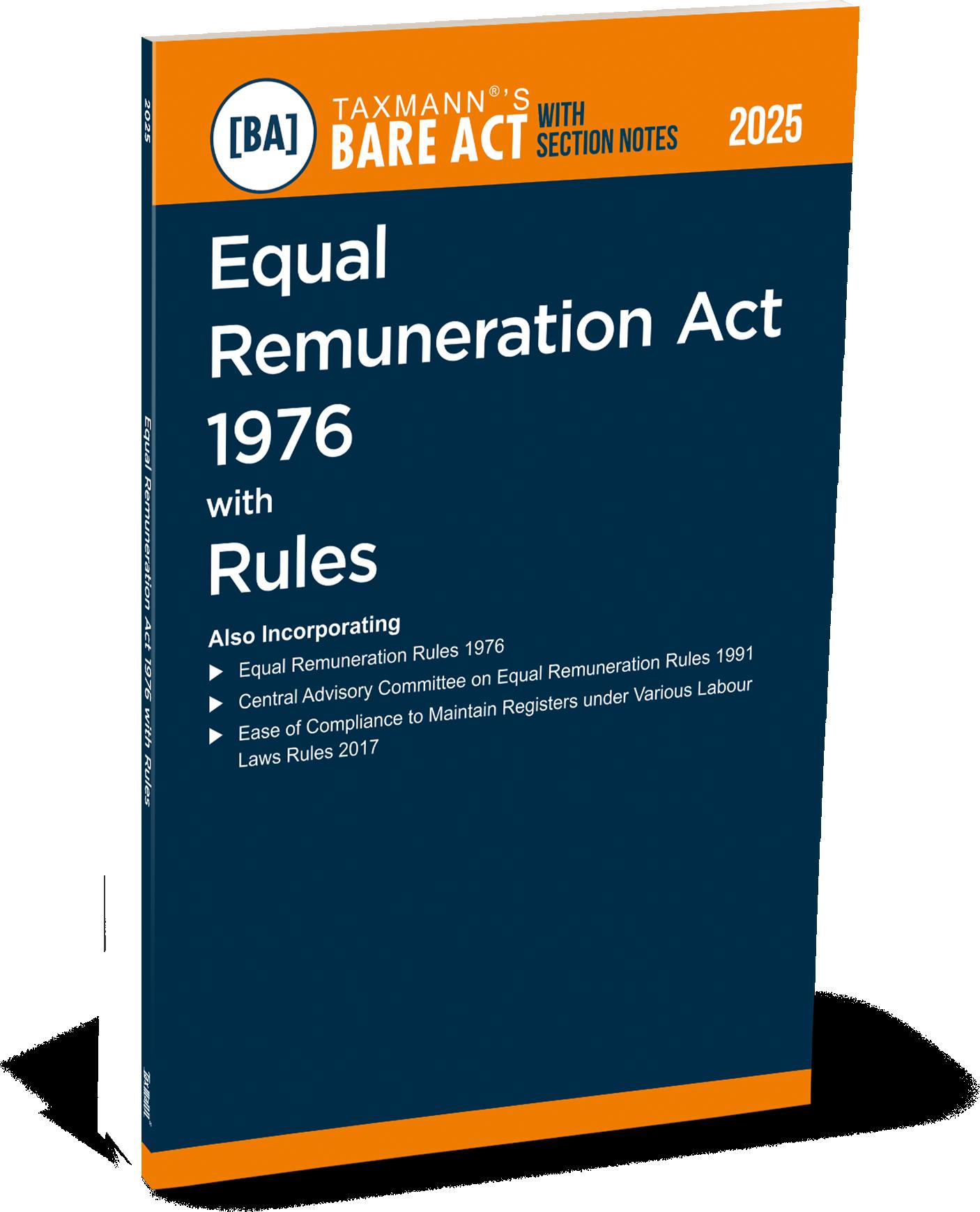© Taxmann Price : ` 95
Published by :
Taxmann Publications (P.) Ltd.
Sales & Marketing : 59/32, New Rohtak Road, New Delhi-110 005 India
Phone : +91-11-45562222
Website : www.taxmann.com
E-mail : sales@taxmann.com
Regd. Office : 21/35, West Punjabi Bagh, New Delhi-110 026 India
Printed at :
Tan Prints (India) Pvt. Ltd.
44 Km. Mile Stone, National Highway, Rohtak Road Village Rohad, Distt. Jhajjar (Haryana) India
E-mail : sales@tanprints.com
Disclaimer
Every effort has been made to avoid errors or omissions in this publication. In spite of this, errors may creep in. Any mistake, error or discrepancy noted may be brought to our notice which shall be taken care of in the next edition. It is notified that neither the publisher nor the author or seller will be responsible for any damage or loss of action to any one, of any kind, in any manner, therefrom. It is suggested that to avoid any doubt the reader should cross-check all the facts, law and contents of the publication with original Government publication or notifications.
No part of this book may be reproduced or copied in any form or by any means [graphic, electronic or mechanical, including photocopying, recording, taping, or information retrieval systems] or reproduced on any disc, tape, perforated media or other information storage device, etc., without the written permission of the publishers. Breach of this condition is liable for legal action. For binding mistake, misprints or for missing pages, etc., the publisher’s liability is limited to replacement within seven days of purchase by similar edition. All expenses in this connection are to be borne by the purchaser. All disputes are subject to Delhi jurisdiction only.
EQUAL REMUNERATION ACT, 1976
Equal Remuneration Act, 1976 [Shall
be repealed by Code on Wages, 2019,
[25 OF 1976]*
An Act to provide for the payment of equal remuneration to men and women workers and for the prevention of discrimination, on the ground of sex, against women in the matter of employment and for matters connected therewith or incidental thereto.
BE it enacted by Parliament in the Twenty-seventh Year of the Republic of India as follow.—
CHAPTER I
PRELIMINARY
Short title, extent and commencement.
1. (1) This Act may be called the Equal Remuneration Act, 1976.
(2) It extends to the whole of India.
(3) It shall come into force on such date†, not being later than three years from the passing of this Act, as the Central Government may, by noti cation, appoint and different dates may be appointed for different establishments or employments.
COMMENTS
SECTION NOTES
Title and Scope
1.1 Short title [Section 1(1)]
The Act is formally named the “Equal Remuneration Act, 1976.”
1.2 Extent [Section 1(2)]
The Act applies across all of India.
1.3 Commencement [Section 1(3)]
1.3-1 Discretionary implementation
The Central Government holds the authority to determine the commencement date of the Act, providing flexibility for its implementation.
*Dated 11-2-1976.
†Came into force on 8-3-1976, vide Notification S.O. 175(E) dated 6-3-1976.
This commencement is restricted to a timeline not exceeding three years from the passing of the Act.
The Central Government may appoint different dates for different establishments or types of employment.
De nitions.
2. In this Act, unless the context otherwise requires,—
(a) “appropriate Government” means,—
(i) in relation to any employment carried on by or under the authority of the Central Government or a railway administration, or in relation to a banking company, a mine, oilfield or major port or any corporation established by or under a Central Act, the Central Government; and
(ii) in relation to any other employment, the State Government;
(b) “commencement of this Act” means, in relation to an establishment or employment, the date on which this Act comes into force in respect of that establishment or employment;
(
c) “employer” has the meaning assigned to it in clause (f) of section 2 of the Payment of Gratuity Act, 1972 (39 of 1972);
(d) “man” and “woman” mean male and female human beings, respectively, of any age;
(
e) “noti cation” means a noti cation published in the Of cial Gazette;
(f) “prescribed” means prescribed by rules made under this Act;
(g) “remuneration” means the basic wage or salary, and any additional emoluments whatsoever payable, either in cash or in kind, to a person employed in respect of employment or work done in such employment, if the terms of the contract of employment, express or implied, were ful lled;
(
h) “same work or work of a similar nature” means work in respect of which the skill, effort and responsibility required are the same, when performed under similar working conditions, by a man or a woman and the differences, if any, between the skill, effort and responsibility required of a man and those required of woman are not of practical importance in relation to the terms and conditions of employment;
(i) “worker” means a worker in any establishment or employment in respect of which this Act has come into force;
(j) words and expressions used in this Act and not de ned but de ned in the Industrial Disputes Act, 1947 (14 of 1947), shall have the meanings respectively assigned to them in that Act.
COMMENTS
SECTION NOTES
Definitions
2.1 Remuneration [Section 2(g)]
Comprises:
Basic wage or salary.
Additional emoluments payable in cash or kind, provided they stem from the fulfilment of employment terms (express or implied).
2.2 Same work or work of a similar nature [Section 2(h)]
Encompasses work where:
The skill, effort, and responsibility required are the same.
Working conditions are similar.
Minor differences in skill, effort, or responsibility are considered insignificant for determining equal treatment in terms and conditions of employment.
CASE LAWS
Similarity in work requirements – Burden of proof - The Supreme Court emphasized that the principle of “equal pay for equal work” under the Equal Remuneration Act necessitates proof of similarity in the skill, effort, and responsibility required for the work. It ruled that the burden of establishing this similarity lies with the individual alleging discrimination. In this case, lecturers from Madhya Pradesh Higher Secondary Schools, despite having equivalent qualifications and service conditions to non-technical lecturers in technical schools, failed to demonstrate similarity in job responsibilities. Consequently, their claim for equal pay under the Act was rejected. – State of Madhya Pradesh v. Pramod Bhartiya AIR 1993 SC 286.
Appropriate Government for Independent Contractors - The Karnataka High Court ruled on the definition of “appropriate government” under section 2(a) of the Equal Remuneration Act, 1976, in cases involving independent contractors. The petitioners, partners of a firm executing construction contracts for a Central Government entity, argued that their employment fell under the purview of the State Government as per section 2(a)(ii). The Court held that the firm acted as independent contractors, not under the authority or control of the Central Government. Thus, the State Government, and not the Central Government, was deemed the appropriate government. Complaints filed with the sanction of the Central Government were invalid, leading to the quashing of proceedings against the contractors. – K.E. Koshy v. The State 1988 LAB. I. C. 879.
Act to have overriding effect.
3. The provisions of this Act shall have effect notwithstanding anything inconsistent therewith contained in any other law or in the terms of any award, agreement or contract of service, whether made before or after the commencement of this Act, or in any instrument having effect under any law for the time being in force.
EQUAL REMUNERATION ACT 1976 WITH RULES – BARE ACT WITH SECTION NOTES
AUTHOR : TAXMANN'S EDITORIAL
PUBLISHER : TAXMANN
DATE OF PUBLICATION : MAY 2025
EDITION : 2025 EDITION
ISBN NO : 9789364554282
NO. OF PAGES : 44
BINDING TYPE : PAPERBACK
BOARD
DESCRIPTION
Equal Remuneration Act 1976 with Rules [Bare Act with Section Notes] by Taxmann comprehensively presents the text of the Act alongside its allied Rules. Accompanied by concise section-wise notes, it elucidates 'equal pay for equal work', prohibitions on gender-based discrimination, and employers' statutory obligations. Updated with the latest amendments, it also covers relevant rules and notifications, serving as a single, up-to-date source for India's labour law on equal remuneration. This book is intended for the following audience:
• Legal Practitioners & Litigators
• Corporate Entities & HR Professionals
• Academicians & Law Students
• NGOs & Women's Rights Activists
The Present Publication is the 2025 Edition, covering the amended and updated text of the Equal Remuneration Act [Act No. 25 of 1976] and Rules, with the following noteworthy features:
• [Bare Act with Section Notes] Original sections plus explanatory commentary
• [Updated Incorporations] Equal Remuneration Rules 1976, Central Advisory Committee Rules 1991, Ease of Compliance Rules 2017
• [Pre-Amendment Provisions] Footnotes clarifying earlier law and transitional applicability
• [Judicial References] Landmark cases illustrating 'equal pay' and non-discrimination
• [Practical Insights] Compliance steps, penalties, and roles of relevant authorities
• [User-friendly Format] Clear layout, cross-references, and quick navigation
• [Repeal & Saving Clauses] Flags relevant updates regarding the eventual repeal by the Code on Wages 2019 (yet to be notified), helping readers understand ongoing legal transitions






